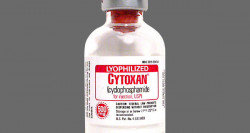Cytoxan (cyclophosphamide) Coupons, Discounts & Cost
Cytoxan (cyclophosphamide) is an alkylating antineoplastic agent. One way to save money on the Cytoxan (cyclophosphamide) retail cost regardless of income and insurance status is to use Cytoxan (cyclophosphamide) coupons or discount cards from RXCoupons. Use our Cytoxan (cyclophosphamide) coupons at your online pharmacy and receive up to 75% off the sale price each time you refill your prescription.
What is Cytoxan (cyclophosphamide)?
Cytoxan (cyclophosphamide) is an alkylating antineoplastic agent. It has a cytostatic and immunosuppressive effect. The drug is approved for use as monotherapy or in combination with other drugs for the treatment of the following diseases: acute lymphoblastic leukemia in children, acute myeloid leukemia, mammary cancer, chronic lymphocytic leukemia, chronic myeloid leukemia, Hodgkin's lymphoma, multiple myeloma, mycosis fungoides, neuroblastoma, ovarian cancer, retinoblastoma (malignant tumor of the retina), autoimmune diseases including connective tissue diseases (autoimmune hemolytic anemia, psoriatic arthritis, rheumatoid arthritis, systemic lupus erythematosus, nephrotic syndrome, multiple sclerosis).
Cyclophosphamide is sometimes used in glomerulonephritis, dermatomyositis, Wegener's granulomatosis.
What should you know about Cytoxan (cyclophosphamide) contraindications?
The main contraindications for Cytoxan (cyclophosphamide): anemia, cachexia, severe heart disease, serious liver and kidney problems, leukopenia and thrombocytopenia.
What should you know about Cytoxan (cyclophosphamide) side effects?
Common side effects of Cytoxan (cyclophosphamide) include nausea, vomiting, partial or complete loss of hair (90% of patients), dizziness, dysuria, hematuria, blurred vision, bone pain (2-3 weeks).
Cytoxan (cyclophosphamide) dosage
Different treatment regimens are available for Cytoxan (cyclophosphamide): - 200 mg (3 mg/kg) every day, or 400 mg (6 mg/kg) every other day (oral, intravenous or intramuscular injection); - 1 g (15 mg/kg) every 5 days (intravenously); - 2-3 g (30-45 mg/kg) every 2-3 weeks (intravenously).
In some cases, there may be other treatment regimens.
Cytoxan (cyclophosphamide) interaction with other drugs
Chlorpromazine, tricyclic antidepressants, barbiturates, thyroid hormones, inducers of microsomal enzymes may increase the effect of Cytoxan, while corticosteroids and inhibitors of microsomal enzymes may weaken the effect of the drug.
Doxorubicin and cytarabine increase the cardiotoxicity of the drug.
What should you know about Cytoxan (cyclophosphamide) special instructions?
In the case of febrile neutropenia or leukopenia, patients should use antibiotics or antifungal agents.
Patients with reduced immunity should be carefully monitored (for example, patients with diabetes or chronic diseases of the liver or kidney).
Patients should exclude obstruction of the urinary tract, cystitis or other infections (before therapy with cyclophosphamide).
Cardiotoxic effects of cyclophosphamide may be enhanced in patients with previous radiation therapy or concomitant therapy with anthracyclines or pentostatin.
Patients may use antiemetic drugs to reduce the severity and frequency of nausea and vomiting. Alcohol may exacerbate nausea and vomiting induced by cyclophosphamide.
Patients with diabetes must regularly check blood glucose concentration in order to improve glycemic control.
In case of cough, fever, hoarseness, painful or difficult urination, pain in the lower back, bleeding, blood in urine or feces, patients should consult a doctor immediately.
Extreme caution is required in case of thrombocytopenia during dental procedures and other invasive procedures. Such patients must carefully brush their teeth, shave, use toothpicks, avoid falls and other injuries, and avoid alcohol and acetylsalicylic acid (high risk of gastrointestinal bleeding).
It is recommended to avoid contact with infectious patients during treatment with cyclophosphamide. It is necessary to delay the vaccine (3-12 months after the completion of the last course of chemotherapy).
Some patients treated previously with cyclophosphamide or other anticancer agents may suffer from secondary malignancies. Secondary tumors often develop in patients with disorders of the immune processes. In some cases, secondary tumors develop several years after discontinuation of therapy.
When infection occurs during treatment with cyclophosphamide, the dose of the drug should be reduced.

